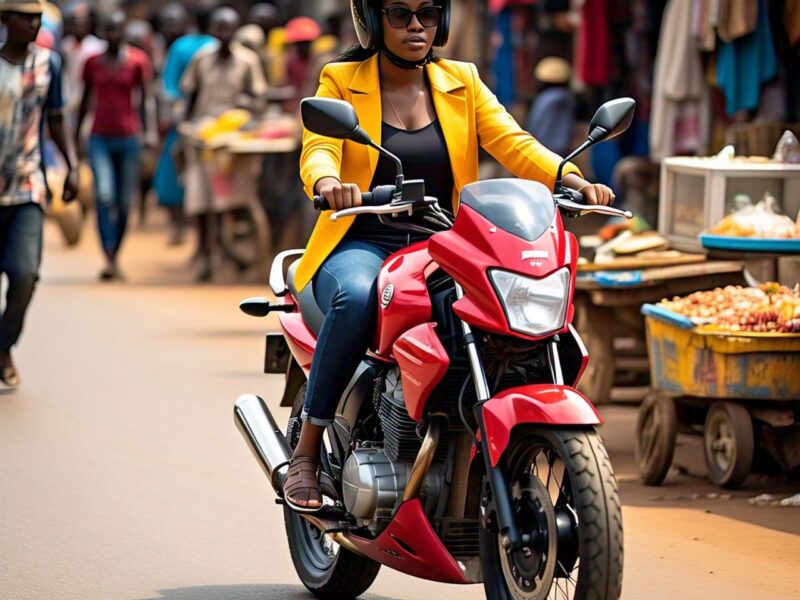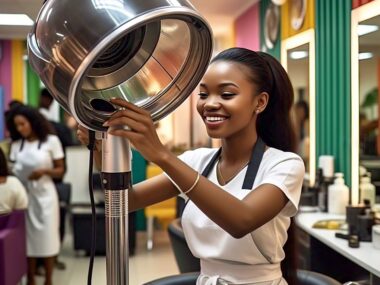What is a Ladies Bike? Defining the Category
A ladies bike in Nigeria typically refers to a lightweight motorcycle designed for female riders. These bikes feature lower seat heights, step-through frames, and ergonomic adjustments to suit the average female physique, offering ease of use and enhanced control. Popular among women for personal commuting, small-scale delivery, or even leisure, ladies bikes stand out with their vibrant colors—think pink, red, or sky blue—and compact designs. Brands like Haojue, Qlink, and TVS dominate this segment, tailoring their models to meet the needs of Nigerian women.
The cost of these bikes varies widely based on factors such as brand reputation, engine capacity (usually 100cc to 125cc), and whether they’re brand new or fairly used. Below, we break down the pricing landscape to give you a clear picture.
Current Prices of Ladies Bikes in Nigeria in 2025
As of April 2025, the Nigerian motorcycle market reflects the country’s economic conditions, including inflation and exchange rate fluctuations. These factors directly impact the cost of imported bikes and locally assembled models. Here’s a detailed rundown of ladies bike prices based on market trends:
Brand New Ladies Bikes
- Haojue HJ110-2D (Lucky): Priced between ₦950,000 and ₦1,200,000, this model is a favorite for its sleek design and reliable 110cc engine. Available in feminine shades like pink and white, it offers a fuel capacity of 4.2 liters and a 4-speed transmission.
- Qlink Target: Ranging from ₦900,000 to ₦1,150,000, the Qlink Target boasts a 110cc engine, Bluetooth MP3 features, and a stylish finish in colors like red and black. It’s built for durability on Nigerian roads.
- TVS Neo XR: Costing ₦850,000 to ₦1,000,000, this 110cc bike is fuel-efficient and ideal for city commuting, with a lightweight frame perfect for female riders.
- Denstar Lucky Plus: Priced at ₦950,000 to ₦1,100,000, this model includes a 110cc engine and modern features like digital speed clocks, appealing to tech-savvy women.
Fairly Used Ladies Bikes
- Haojue Lucky (Used): Available for ₦500,000 to ₦750,000, depending on condition, mileage, and location. A well-maintained unit can rival a new bike in performance.
- Qlink Target (Used): Typically ₦450,000 to ₦700,000, these are popular in urban centers like Lagos and Abuja, often sourced from previous owners or dealerships.
- TVS Neo XR (Used): Priced between ₦400,000 to ₦650,000, offering an affordable entry point for budget-conscious buyers.
- Generic Ladies Bikes (Used): Lesser-known brands or older models can be found for ₦300,000 to ₦500,000, though quality varies significantly.
These prices are sourced from online marketplaces like Jiji.ng, Carmart.ng, and physical dealerships across Nigeria, reflecting the market as of early 2025. Note that costs may fluctuate based on location—urban areas like Lagos often see higher prices due to demand, while rural regions might offer slight discounts.
Factors Affecting Ladies Bike Prices in Nigeria
Several elements influence the cost of a ladies bike, making it essential to consider more than just the sticker price. We’ve outlined the key factors below:
- Brand and Model: Premium brands like Haojue and TVS command higher prices due to their reliability and widespread spare parts availability. Lesser-known brands offer cheaper alternatives but may lack in longevity.
- Condition: New bikes carry a premium for their untouched engines and warranties, while used bikes vary based on wear, maintenance history, and documentation.
- Engine Capacity: Most ladies bikes range from 100cc to 125cc, balancing power and ease of handling. Higher capacities (e.g., 150cc) increase costs but are less common in this category.
- Location: Prices in cities like Lagos, Abuja, and Port Harcourt tend to be 10–20% higher than in smaller towns due to logistics and market demand.
- Additional Features: Bikes with Bluetooth, MP3 players, or enhanced aesthetics (e.g., chrome finishes) cost more than basic models.
- Economic Factors: With the naira’s value fluctuating against the dollar, imported bikes or parts see periodic price hikes, a trend evident in 2024 and continuing into 2025.
Understanding these variables helps you anticipate the total investment and avoid overpaying.
Where to Buy a Ladies Bike in Nigeria
Finding the right ladies bike at a competitive price requires knowing where to look. We’ve compiled the best options:
- Online Marketplaces: Platforms like Jiji.ng and Carmart.ng list both new and used ladies bikes, often with negotiable prices and seller contact details. For instance, a used Haojue Lucky in Ibadan might be listed at ₦600,000, open to bargaining.
- Dealerships: Authorized dealers in cities like Lagos (e.g., Simba Planet) and Abuja offer brand-new bikes with warranties, though at full retail cost—expect ₦950,000+ for a Haojue model.
- Local Markets: Motorcycle hubs in Ogba (Lagos), Onitsha, or Kano provide a mix of new and used options. Prices here can dip as low as ₦400,000 for a used bike, but inspection is crucial.
- Direct Imports: Some buyers import bikes via agents, though this adds customs duties (approximately 20–30% of the bike’s value) and shipping fees, pushing costs above ₦1,500,000.
Each avenue has its pros and cons—online offers convenience, dealerships ensure quality, and local markets provide affordability.
Additional Costs to Consider
Beyond the purchase price, owning a ladies bike in Nigeria incurs extra expenses. We’ve detailed these to help you budget comprehensively:
- Registration and Documentation: Registering a new bike with the Federal Road Safety Corps (FRSC) costs ₦15,000 to ₦25,000, including plate numbers and papers. Used bikes may need renewal fees of ₦5,000–₦10,000.
- Insurance: Basic third-party insurance, mandatory for road use, ranges from ₦5,000 to ₦10,000 annually.
- Accessories: Helmets (₦5,000–₦15,000), gloves (₦3,000–₦8,000), and rain gear (₦10,000–₦20,000) enhance safety and comfort.
- Maintenance: Routine servicing—oil changes, tire replacements—averages ₦10,000–₦20,000 yearly, depending on usage.
- Fuel: With a 4-liter tank and fuel at ₦600/liter (April 2025 estimate), a full tank costs ₦2,400, lasting 100–150 km.
Factoring in these costs, your first-year ownership might add ₦50,000–₦100,000 to the initial price, a critical consideration for long-term planning.
Popular Ladies Bike Brands in Nigeria
Several brands dominate the ladies bike market, each offering unique features and price points. Here’s a closer look:
Haojue
- Price Range: ₦950,000–₦1,200,000 (new); ₦500,000–₦750,000 (used)
- Why Popular: Known for durability, stylish designs, and a strong presence in Nigeria, with spare parts widely available.
Qlink
- Price Range: ₦900,000–₦1,150,000 (new); ₦450,000–₦700,000 (used)
- Why Popular: Affordable, tech-forward features like Bluetooth, and rugged performance on varied terrains.
TVS
- Price Range: ₦850,000–₦1,000,000 (new); ₦400,000–₦650,000 (used)
- Why Popular: Fuel efficiency and lightweight frames make it a top choice for urban female riders.
Denstar
- Price Range: ₦950,000–₦1,100,000 (new); ₦450,000–₦700,000 (used)
- Why Popular: Modern aesthetics and reliable engines cater to women seeking both form and function.
Read also: How Much Is a Bajaj Bike in Nigeria? A Detailed Price Breakdown
Tips for Getting the Best Deal
We’ve gathered practical strategies to ensure you pay the right price for your ladies bike:
- Negotiate: Sellers on Jiji.ng or in local markets often list higher prices expecting haggling—aim for 10–15% below the asking price.
- Inspect Used Bikes: Check the engine, tires, and frame for wear; test-ride to confirm functionality.
- Buy Off-Season: Prices dip slightly during rainy months (June–September) when demand drops.
- Avoid Middlemen: Purchasing directly from owners or dealers cuts out inflated agent fees, saving you ₦50,000 or more.
These tactics maximize value, whether you’re eyeing a new Haojue or a used Qlink.
Why Ladies Bikes Are Worth the Investment
Investing in a ladies bike in Nigeria offers more than just transportation. Their lightweight design and lower fuel consumption (averaging 40–50 km/liter) make them cost-effective for daily commutes. In cities like Lagos, where traffic snarls are common, these bikes provide agility, slipping through gridlock with ease. For rural women, they’re a lifeline for accessing markets or healthcare, blending practicality with empowerment. At ₦850,000–₦1,200,000 for a new model, the upfront cost is offset by long-term savings and convenience.
Frequently Asked Questions
How Much is a Brand New Ladies Bike in Nigeria?
A new ladies bike costs between ₦850,000 and ₦1,200,000, depending on the brand and features.
Can I Get a Used Ladies Bike Under ₦500,000?
Yes, fairly used options from brands like TVS or Qlink start at ₦400,000, though condition varies.
What’s the Cheapest Ladies Bike Available?
Generic or older used models can be found for ₦300,000–₦400,000, ideal for tight budgets.
Read also: How Much is a Bicycle in Nigeria? Prices & Buying Guide (2025)
Final Thoughts on Ladies Bike Costs
Determining how much a ladies bike costs in Nigeria in 2025 hinges on your preferences—new or used, premium or budget, urban or rural use. With prices ranging from ₦300,000 for a used generic bike to ₦1,200,000 for a top-tier Haojue, there’s an option for every rider. By factoring in additional costs and leveraging smart buying strategies, you can secure a bike that fits both your needs and wallet. As the market evolves, staying informed ensures you ride away with the best deal.

